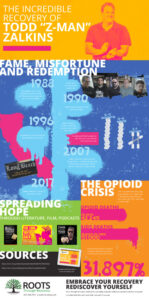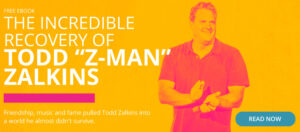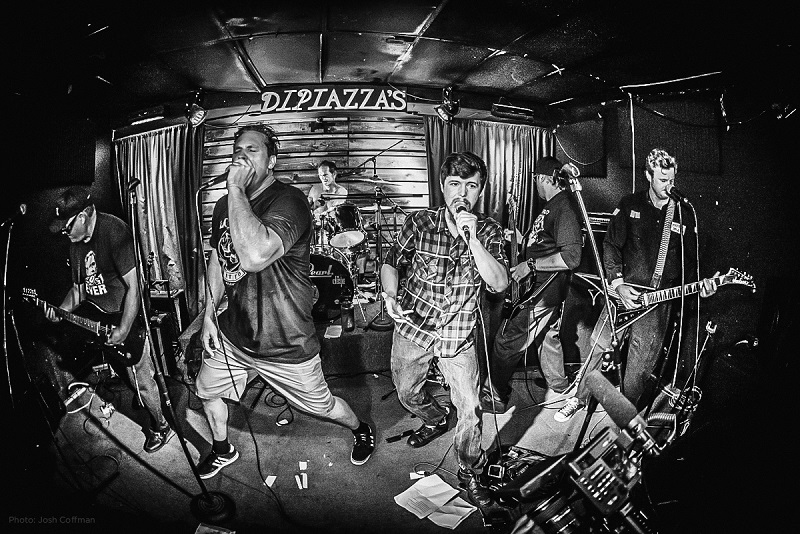Todd Zalkins is lucky to be alive.
In 2007, after a 17-year addiction to OxyContin and other prescription opioid painkillers, Zalkins checked himself in to a treatment center for help beating one of the worst cases of painkiller addiction his doctor had ever seen.
Zalkins’ severe opioid addiction and subsequent recovery is the subject of the 2017 independent film The Long Way Back: The Story of Todd “Z-Man” Zalkins. The film won Best Documentary at the 2017 Phoenix Film Festival and was an Official Selection at the 2017 Newport Beach Film Festival, the 2017 Long Beach International Film Festival and the 2017 Asbury Park Music & Film Festival.
We recently sat down with Zalkins, a Long Beach native, to discuss the movie, get his take on the opioid crisis and talk about his ongoing recovery and his work in the field.
Punk, Pills and the Long Way Back
The Long Way Back chronicles Zalkins’ early life in Long Beach’s Belmont Shore neighborhood. He became fast friends with Brad Nowell, Eric Wilson and Bud Gaugh, a trio who would later form the celebrated ska punk band Sublime. Together, the four fun-loving friends skated, surfed and partied their way through high school, drinking heavily and snorting piles of cocaine they stole from a friend’s dad.
In their twenties, the four were full-fledged purveyors of Long Beach’s punk rock scene, which produced bands like The Vandals, T.S.O.L. and Tex & the Horseheads. Sublime formed in 1988, right around the time heroin entered the Long Beach punk scene. Zalkins, who is deeply afraid of needles, stayed away from the drug. However, his pals dabbled in it, including Nowell, Sublime’s talented songwriter and front man.
Despite his fear of needles, Zalkins wasn’t immune to opioid addiction. In 1990, while attending San Diego State University, he suffered a back injury and was prescribed Vicodin for the pain. But instead of the four tablets a day he was prescribed, he was soon taking 30 each day. He moved back to Long Beach, where he became the cigar-chomping ringleader and instigator of the Sublime crew, reveling in chaos and maintaining a constant supply of cocaine, pills and booze. In 1995, Zalkins became the star of Sublime’s video for the song “Date Rape,” which began to get serious airplay on college stations across the country.
Tragedy Strikes the Punk Scene
Meanwhile, Nowell was sinking deeper into a serious heroin addiction. He talked about getting clean for his girlfriend Troy and infant son Jakob, but on May 25, 1996, just seven days after marrying Troy and only a few hours after lamenting to Zalkins that he missed his wife and son, Nowell died of a heroin overdose after a show.

Dave Donaldson, a friend of the band, says in the film that he thought Nowell’s death would be a wakeup call. “It was the exact opposite. It was game on. ‘We’re just gonna stuff ourselves with whatever substances we can to numb the pain and act like we’re still having fun.’” He pauses. “It’s amazing that any of them are still alive, really.”
Zalkins’ mother says he was inconsolable after Nowell’s death. He left Long Beach and moved to San Clemente and, despite his addiction to painkillers, started a successful insurance firm. His life continued to be fueled by alcohol, pills and cocaine. “I was really enjoying it while the night was going,” Zalkins says in the film, “but the following days were always terrifying for me… It would get scary, laying in bed with my heart starting to skip beats, and I’m like, I’ll never do it again, I’ll never do it again, just gonna give my heart a rest and never do that stuff again. And a week later, I’d buy another ounce of cocaine.”
In 1998, three years after OxyContin was approved for sale in the U.S., Zalkins got a prescription for it, and his pill addiction escalated. He had a doctor in San Diego and one in Santa Ana. The street value of his monthly pill supply was $23,000.
The Spiral to Rock Bottom and the Journey Back to the Top
Around the tenth year of Zalkins’ addiction, things began to shift. He was taking 16 to 18 OxyContin tablets a day, plus 12 to 16 Norcos and two or three fentanyl sticks, which are used to treat the kind of severe pain caused by cancer or burns. His daily opioid habit was equal to 100 Vicodin tablets.
Zalkins’ doctors found out about each other and cut off his supply. He began buying big balls of tar heroin to smoke and started forging prescriptions. He became antisocial. He stopped showing up to his office. He quit returning his mom’s phone calls and began avoiding everyone who loved him. “I’d lost my mind,” Zalkins says in the film. “I couldn’t speak clearly, and something was broken. I wasn’t functioning as a human being, and that was the end of the line for me.”
On February 16, 2007, Zalkins checked himself into rehab. He didn’t sleep for 44 days, and he had tremors for nine months after detox. As he faced his demons during his first few years of recovery—and there were many—he wept “all the time.”
Nine months into his sobriety, Zalkins made peace with his estranged father. But just three days shy of Zalkins’ one-year sober anniversary, his father committed suicide. Still, Zalkins stayed in recovery. He spread his father’s ashes in the ocean and went surfing or long-distance swimming every day with his dad.
During those early years of his recovery, Zalkins wrote Dying for Triplicate, a memoir about his addiction. The book sold more than 50,000 copies and helped people all over the world who were struggling with their own addictions.
A Film About Redemption
A few years after the publication of his book, Zalkins was contacted by a film producer in Canada who wanted to make a documentary about his story. That producer was Richard Yelland, who flew Zalkins to Vancouver to discuss the project. “I became intrigued about the idea of it all,” Zalkins says. “Ultimately, another film producer became involved, and the rest is history.”
Zalkins says that making the film was a very painful process for him. “We had to continue to revisit some subject matter that was often difficult to dredge up, listen to and watch. But it had to be done in order to get an effective message across. At the end of the day, I believe in my heart we have made a film with a good message, with hope and awareness.” Zalkins began to receive messages from people all over the U.S. and other countries who saw the film and were helped by it. “In the end, that is all that matters to me,” Zalkins says.
The Long Way Back is just as dark and emotional as you might expect, but it’s also a story of redemption, fraught with hope and offering inspiration to others struggling with opioid addiction. And in the midst of the currently worsening opioid crisis in America, it’s a timely tale.
If you or someone you know is struggling with drug addiction in Long Beach, don’t hesitate to seek help. Rehab and detox facilities like Roots Through Recovery have programs that can help you combat addiction as well as any co-occurring conditions. Roots Through Recovery facility in Long Beach is easily accessible via South Bay, Catalina Island, and Orange County. Visit 3939 Atlantic Ave, Suite 102 Long Beach, CA 90807 or call (866) 766-8776.
Read part two of this series, The Incredible Recovery of Todd “Z-Man” Zalkins, Part II: The Opioid Crisis in Southern California, or download the entire series now as a fully illustrated eBook:





1 thought on “The Incredible Recovery of Todd “Z-man” Zalkins, Part I”
Hello can u please provide me with the treatment center that u went to for help. I have been to many and the last 3 I went to for street fentanyl and they just could not get me through the detox. The illicit street acts so different then pharma fent and they just don’t seem to understand it enough to treat it. Anyways I am desperate and willing thanks